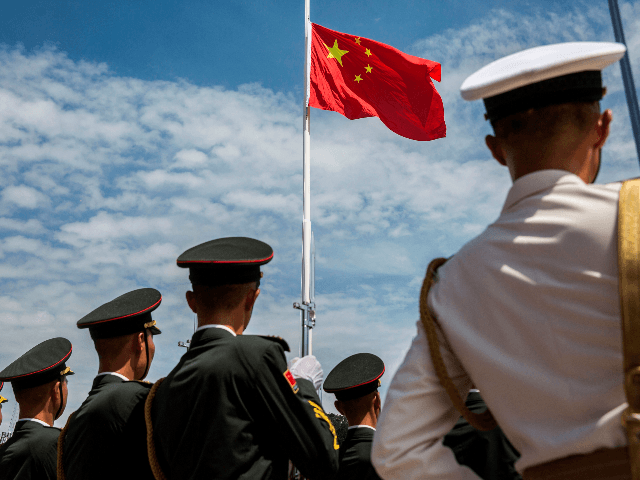Maj. Gen. Chen Daoxiang, commander of People’s Liberation Army (PLA) forces in Hong Kong, reportedly promised a Pentagon official last month that Chinese troops will not be deployed against protesters, attempting to allay fears of a deadly Tiananmen Square-style crackdown on the huge and thus far successful movement.
Reuters reported on Wednesday that Gen. Chen made the promise to David Helvey, the U.S. principal deputy assistant secretary of defense for Indo-Pacific security affairs, when Helvey paid a visit to PLA headquarters in Hong Kong on June 13.
PLA headquarters is located in the same area where massive protests against the extradition bill favored by China, but despised by most Hong Kongers, have taken place. Helvey’s visit took place the day after one of the most intense nights of the extradition bill saga when police used what critics have denounced as excessive force to disperse demonstrators.
“Major General Chen made it clear from the outset that the PLA would not breach their long-standing principle of non-interference in Hong Kong affairs,” a source told Reuters.
“It was surprising because he took it upon himself to raise it. It was a clear signal, coming at a sensitive time,” the source added.
A U.S. defense official confirmed the meeting between Helvey and Chen, while Chinese military sources said the PLA continues to remain neutral, although the Chinese Defense Ministry did not offer an official comment.
Reuters noted that the “Basic Law” that defines Hong Kong’s autonomy after it returned to Chinese control in 1997 explicitly forbids the Chinese military from interfering in “local affairs,” but it also allows either the Hong Kong government or the National People’s Congress in Beijing to declare a state of emergency and request a military deployment.
Every analyst quoted by Reuters agreed that deploying the military would both embarrass the Hong Kong government and dramatically inflame the situation, as it would be seen as an admission of failure on the part of Hong Kong’s government, trigger an even worse assault on the island’s autonomy than the hated extradition bill was, and be a very uncomfortable reminder of the Tiananmen Square massacre.
The analysts also agreed that calling out the military was not unthinkable if the protest movement becomes too much of a threat to China’s interests.
“The Hong Kong garrison might seem like a symbolic presence, but the bottom line is that you can never really be sure they won’t be used, particularly if things start to move in a whole new direction, such as inspiring protest action on the mainland,” cautioned RAND Corporation security analyst Derek Grossman.
The PLA garrison in Hong Kong, which counts somewhere between five and ten thousand troops according to outside estimates, has not been entirely invisible during the protests.
At the end of June, the garrison conducted a joint air and naval exercise advertised after the fact in PLA newspapers and social media accounts. The goal of the exercise was described as “raising the unit’s combat abilities in emergency dispatches, ad hoc deployment, and joint operations.” PLA press materials included plenty of photos of Chinese troops, weapons, warships, and combat aircraft.
“The garrison holds such exercises regularly but the newspaper chose to publish details of these activities because it wants to tell the outside world that this is a sovereignty issue for China,” a source in the mainland Chinese government said, framing the exercise as a warning to outside powers rather than an effort to intimidate the demonstrators.
This spin was disputed by observers in Hong Kong, who noted the PLA garrison rarely publicizes its activities. Similar drills were held at the height of the Occupy Central or “Umbrella” Movement in 2014. Skeptics said Beijing clearly wanted to flex its military muscle in Hong Kong and remind the demonstrators there are lines they must not cross.

COMMENTS
Please let us know if you're having issues with commenting.